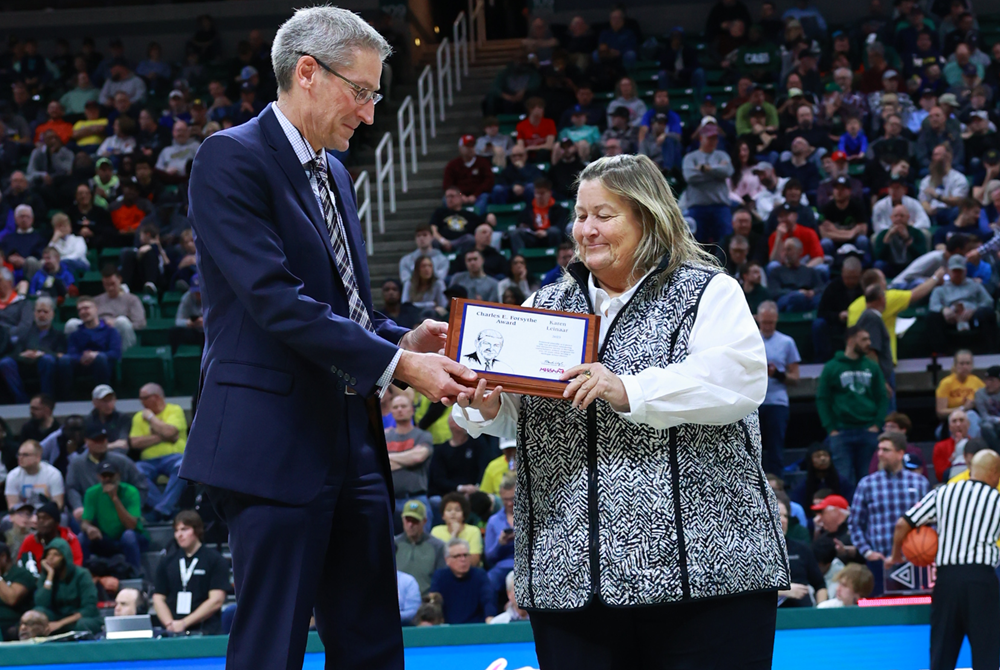
Schools Continue to Manage the Heat
July 16, 2015
By Rob Kaminski
MHSAA benchmarks editor
It certainly was not the MHSAA’s intent to spur the most historically frigid back-to-back winters the state has seen. Nor did the Association wish for one of the mildest summers in recent memory during 2014.
Seemingly, it’s just Mother Nature’s way of reading into MHSAA efforts for managing heat and humidity and acclimatizing student-athletes for warm-weather activities.
Since guidelines were put in place (recommended for regular-season sessions and required for postseason tournaments) before the 2013-14 school year, there have been relatively few days during which psychrometers have had to be implemented.
“The key is, we’ve got plans in place for when the climate returns to normal trends for return-to-school practices and contests in August and September, as well as early June events,” said MHSAA Executive Director Jack Roberts. “It is a bit ironic that there have been relatively few days since the guidelines were established that they’ve actually come into play.”
In a nutshell, the guidelines provide instruction for four ranges of heat index: below 95 degrees; 95-99 degrees; 99-104 degrees, and heat indexes above 104 degrees, with increasing precautions in place as heat indexes rise. An index above 104 calls for all activity to cease.
Certified athletic trainers Gretchen Mohney and James Lioy agree that recent requirements in heat and hydration guidelines are a step in the right direction and encourage that – when possible – an athletic trainer oversee the implementation. Simply taking a reading from just outside the AD’s office or at home does not simulate on-site conditions.
“This doesn’t take into account the radiant heat at the site, which can drastically affect the conditions that athlete plays in. It is essential that all parties involved in making decisions to play collaborate with one another,” Mohney said.
Heat-related deaths in athletics rank only behind cardiac disorders and head and neck injuries, but such fatalities might lead the way in frustration for families and communities of the victims. The reason? Heat-related illness is totally preventable.
Another source of mild frustration is the lack of recording within the state for those practice and game situations which warrant heat protocols.
When the Representative Council was formulating the Heat and Humidity Policy, it was also mindful of ways in which the MHSAA could assist schools in putting the plan into practice. Coaches, athletic directors and trainers needed a method to record information for athletic directors to view and for the MHSAA to track. The MHSAA developed interactive web pages on MHSAA.com which allow registered personnel to record weather conditions as practices and contests are taking place, using psychrometers.
Additionally, discounted Heat and Humidity Monitors and Precision Heat Index Instruments are offered to schools through a partnership between the MHSAA and School Health.
Yet, since the availability of such tools came to fruition two years back, fewer than 1,000 entries have been recorded, and many are multiple entries from the same schools.
Of the 772 entries, only 15 took place when the heat index was in excess of 104, while just 21 indicated an index of greater than 100. Cooler temperatures could be playing a factor in the overall number of participation, particularly in the northern areas of the state.
Nearly all of the responses came during fall practices, with a few isolated cases coming during the spring.
As Mohney pointed out, all resources must be properly used in concert with one another to achieve desired results.
Reminders of the tools available to schools are disseminated throughout the state each summer.

Leinaar to be Inducted into NIAAA Hall of Fame during National ADs Conference
By
Geoff Kimmerly
MHSAA.com senior editor
December 15, 2023
Frankfort’s Karen Leinaar – one of the most active and influential administrators over the century-long history of the MHSAA – will receive deserved national recognition Tuesday with her induction into the National Interscholastic Athletic Administrators Association (NIAAA) Hall of Fame during the closing banquet of the 54th National Athletic Directors Conference in Orlando.
Leinaar is in her fifth school year as executive director of the Michigan Interscholastic Athletic Administrators Association (MIAAA) – the state’s professional organization for school sports administrators – and served as an athletic administrator at five schools over four decades through this spring. She also served 22 years on the MHSAA’s Representative Council and from 2009-13 on the Board of Directors for the National Federation of State High School Associations (NFHS).
She first served as athletic director at Delton Kellogg for nearly 17 years, from March 1982 through October 1998. She spent three years at Gaylord, then 8½ at Benzie Central before taking over at Bear Lake in November 2010 and spending the next decade organizing athletic programs for students in grades 5-12 before retiring in January 2021. She returned to serve as interim AD at Frankfort for the 2022-23 school year.
Leinaar has been honored several times for her contributions, most recently with the MHSAA’s Charles E. Forsythe Award for a lifetime of contributions to school sports. She also received the MHSAA’s Women In Sports Leadership Award in 1998, a Citation from the NFHS in 2000, was named MIAAA Athletic Director of the Year in 2001 and received an MHSAA’s Allen W. Bush Award in 2014.
A multiple-sport standout while attending Delton Kellogg High School, Leinaar graduated in 1977 and then earned a bachelor’s degree in physical education, health and recreation, with a minor in driver education, from Michigan State University in 1982. She completed a master’s in athletic administration from Western Michigan University in 1994.
The NADC banquet begins at 6 p.m. Tuesday and will be streamed live on the NFHS Network at no cost. Click to watch.
PHOTOS Frankfort’s Karen Leinaar accepts the 2023 Charles E. Forsythe Award from Grand Haven superintendent and MHSAA Representative Council president Scott Grimes during the Division 1 Boys Basketball Final in March.

